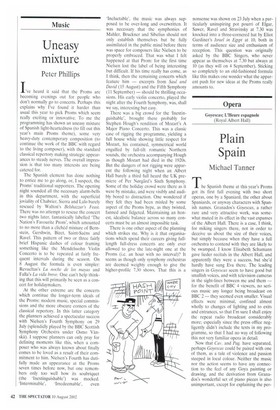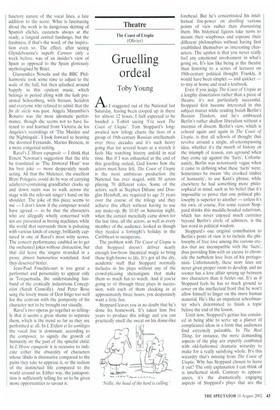Opera
Goyescas; L'Heure espagnole (Royal Albert Hall)
Plain Spain
Michael Tanner
The Spanish theme at this year's Proms got its first full evening with two short operas, one by a Spaniard, the other about Spaniards, or anyway characters with Spanish names. Granados's Goyescas, a rather rare and very attractive work, was somewhat muted in its effect in the vast expanses of the Albert Hall. There is a case, I think, for miking singers there, not in order to deceive us about the size of their voices, but simply because when they have a full orchestra to contend with they are likely to be swamped. I know Elisabeth Schumann gave lieder recitals in the Albert Hall, and apparently they were a success, but she'd hardly have sung Eva there. The leading singers in Goyescas seem to have good but smallish voices, and with television cameras in the sight-lines between me and them — for the benefit of BBC 4 viewers, no serious music any longer being broadcast on BBC 2 — they seemed even smaller. Visual effects were minimal, confined almost wholly to changes of lighting and to exits and entrances, so that I'm sure I shall enjoy the repeat radio broadcast considerably more; especially since the press office negligently didn't include the texts in my programme, so that I had no way of following this not very familiar opera in detail.
Now that Cav. and Pag. have separated, perhaps Goyescas could be paired with one of them, as a tale of violence and passion steeped in local colour. Neither the music nor the action seems to have any connection to the feel of any Goya painting or drawing, and the derivation from Granados's wonderful set of piano pieces is also unimportant, except for explaining the per functoiy nature of the vocal lines, a late addition to the score. What is fascinating about the work is its dangerous skirting of Spanish cliches, castanets always at the ready, a languid central fandango, but the freshness, if that's the word, of the inspiration even so. The effect, after seeing Glyndebourne's superb Carmen only a week before, was of an insider's view of Spain as opposed to the Spain gloriously mythologised by Bizet.
Gianandrea Noseda and the BBC Philharmonic took some time to adjust to the scale of the hall, but then splashed around happily in this opulent music, which belongs in period along with the lush preatonal Schoenberg, with Strauss, Scriabin and everyone who refused to admit that the fin de siècle was past. Angela Marambio's Rosario was the most idiomatic performance, though she seems not to have listened to and learned from Victoria de los Angeles's recordings of 'The Maiden and the Nightingale'. I look forward to hearing the doomed Fernando, Marius Brenciu, in a more congenial setting.
Ravel's L'Heure espagnole — I think that Ernest Newman's suggestion that the title be translated as 'The Immoral Hour' was his best joke — more desperately needs acting. All that the Muleteer, the excellent Brett Polegato, could do by way of carrying adulterer-containing grandfather clocks up and down stairs was to walk across the stage with the relevant singer's hand on his shoulder. The joke of this piece seems to me — I don't know if the composer would have agreed — to be that the characters who are allegedly wholly concerned with sex are presented as boring machines, while the world that surrounds them is pulsating with various kinds of energy, brilliantly captured in one of Ravel's most witty scores. The concert performance enabled us to get the orchestral jokes without distraction, but that did leave the singers stranded in a prosy, almost humourless wasteland. And they deserved better.
Jean-Paul Fouchecourt is too great a performer and personality to appear only as Torquemada, the understanding husband of the erotically industrious Concepcion (Sarah Connolly). And Peter Rose sang the lovely music of Don Inigo too well for the contrast with the pomposity of his character not to be brought out visually.
Ravers two operas go together so tellingly that it seems a great shame to separate them, which is the trend so far as they are performed at all. In L'Enfant et les sortileges the vocal line is dominant, according to the composer, to signify the growth of humanity on the part of the spiteful child. In L'Heure espagnole it is recessive to indicate either the absurdity of characters whose libido is diminutive compared to the pains they take to appease it, or the tedium of the instinctual life compared to the world around us. Either way, the juxtaposition is sufficiently telling for us to be given more opportunities to savour it.



























































 Previous page
Previous page